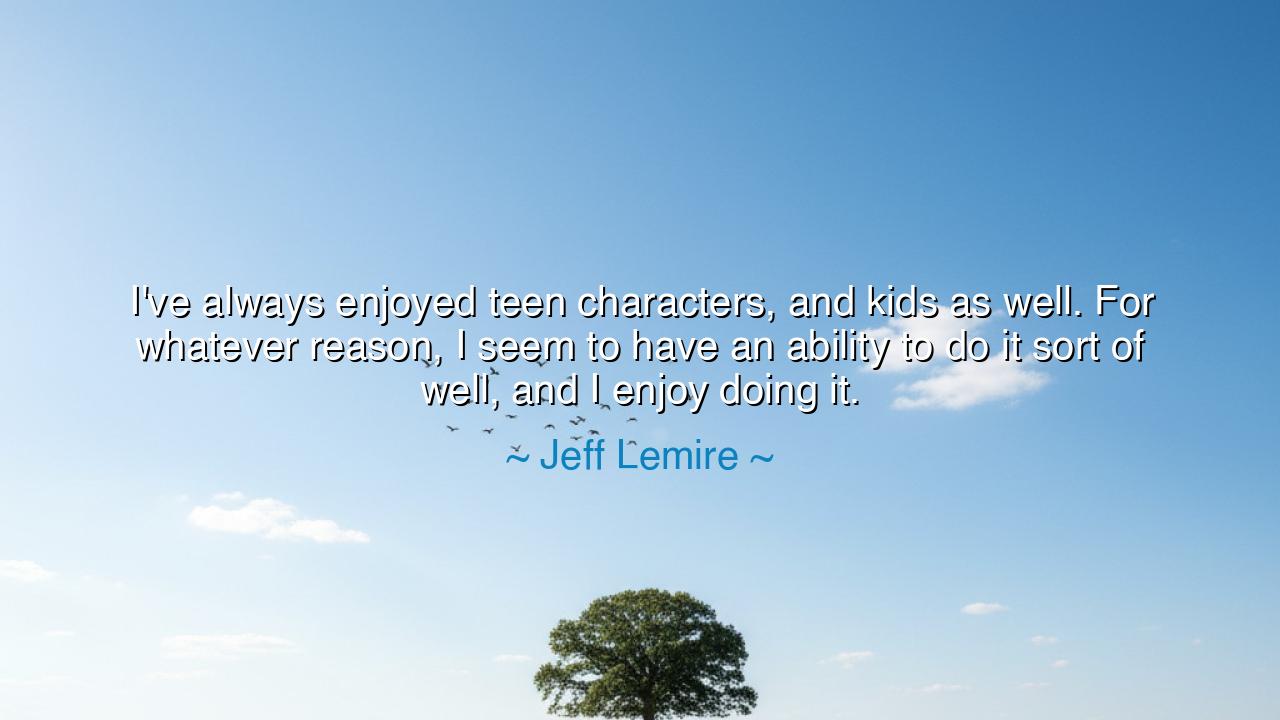
I've always enjoyed teen characters, and kids as well. For
I've always enjoyed teen characters, and kids as well. For whatever reason, I seem to have an ability to do it sort of well, and I enjoy doing it.






Hear now the words of Jeff Lemire, the storyteller of our age, who humbly confessed: “I’ve always enjoyed teen characters, and kids as well. For whatever reason, I seem to have an ability to do it sort of well, and I enjoy doing it.” Though spoken lightly, these words conceal a truth that is heavy with meaning. For to capture the voice of the young is not a small feat; it is to touch the very fountain of humanity, where innocence and turmoil flow together, where the seeds of all future greatness are first planted.
The power of teen characters lies in their rawness, their honesty, their unguarded souls. Unlike the polished figures of adulthood, who often mask themselves with duty, reputation, and fear, the youth of stories carry emotions untamed, unshaped by time. They reveal the struggle between who they are and who they long to be. To write them is to write transformation itself. Jeff Lemire recognizes this gift within him—the ability to step into that liminal space and give it voice, to craft young figures who mirror the doubts, dreams, and daring of real life.
Yet this ability has an ancient echo. Recall the tale of Antoine de Saint-Exupéry, who wrote The Little Prince. In speaking through the mouth of a child, he revealed more wisdom than many philosophers had dared. For only through the eyes of the young could he strip away the illusions of adulthood and remind us of what truly matters: friendship, imagination, and love. Likewise, Lemire’s passion for kids and teens in his work reminds us that within their struggles lies truth unclouded, and within their play lies the essence of wonder.
The origin of this gift may not be easily explained, as Lemire himself admits: “for whatever reason.” Some talents are mysteries, born not of deliberate training but of a deeper alignment between soul and story. Just as Mozart could hear music that others could not, so too do some writers hear the voice of the young with uncanny clarity. Perhaps it is memory of their own youth, still vivid and unforgotten. Perhaps it is empathy, the rare ability to step into the fragile hearts of others. Whatever the cause, such a gift is a sacred one, and to enjoy it, as Lemire does, is to honor it.
Consider also how the world needs such storytellers. For without tales of youth, the young themselves feel unseen, and the old forget what it was to dream. A society without the stories of children and teens grows rigid, blind to renewal, deaf to the cries of its future. Lemire’s devotion to these voices is more than artistic preference—it is a service, a keeping of the bridge between generations. By giving voice to the young, he ensures that their struggles and hopes are not dismissed, but celebrated.
The lesson for us is this: cherish the voices of the young, both in life and in art. Whether you are a parent, a teacher, a writer, or a mere passerby, do not overlook the wisdom of the child or the turbulence of the teen. Listen, and you will hear echoes of your own past, as well as glimpses of what is yet to come. And if you find within yourself, as Lemire did, the ability to nurture or express these voices, do not let it lie dormant—share it, for the world hungers for such light.
Therefore, let us act with reverence and with joy. Let us read the tales of youth, let us encourage the young to tell their own stories, and let us not scorn the emotions of those in their growing years. For they are not merely “characters” but mirrors of the human journey itself. And let us remember Lemire’s humble wisdom: to create for the young, and about the young, is not only an act of art, but an act of love.






AAdministratorAdministrator
Welcome, honored guests. Please leave a comment, we will respond soon